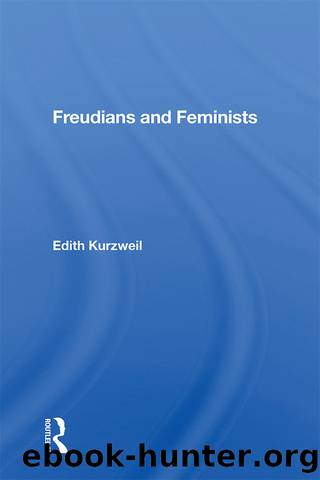Freudians And Feminists by Edith Kurzweil

Author:Edith Kurzweil [Kurzweil, Edith]
Language: eng
Format: epub
Tags: Social Science, Gender Studies
ISBN: 9780429719462
Google: BCuNDwAAQBAJ
Publisher: Routledge
Published: 2019-03-04T04:51:52+00:00
âTraditionalâ Feminists
The women in the Société Psychanalytique de Paris (SPP), of course, were much more tentative. Irigaray's suggestion that homosexuality replace heterosexuality flew in the face of the Freudian theory that guided their practices: Since uncovering the oedipal drama of their patients was the clue to traumatic childhood incidents and the means of bringing about their cure, their feminism derived from work with patients. They focused neither on language nor on linguistic theories but on the (spoken) connections their patients made to the material they dug up from their unconscious. Janine Chasseguet-Smirgel, among others, applied the techniques of ego psychology when showing that the Freudian pleasure principle and the oedipal theory were as universal as Lacan's mirroring and dissection-of-language categories.
In the introduction to her collected essays, Sexuality and Mind (1986), Chasseguet-Smirgel recalled the circumstances under which she had edited another collection of essays, Female Sexuality ([1964] 1985). and that between 1964 and 1975, when she again was asked to address the subject, she had felt compelled to point to the "perennial return" of Wilhelm Reich, who had expected to release individuals' sexual and libidinal energy by means of his orgone box in order to help energize the societal revolution Marx had predicted. She also spoke of the ever-recurring theme of "the disappearance of the father and of his function as the separation between mother and child, ... [including] the disappearance of the 'Ego'" (Chasseguet-Smirgel, 1986, p. 2). And she stressed that she felt she then had had to respond to Deleuze and Guattari's antioedipal ideology and to the then prevalent infatuation with Maoism and the Chinese Cultural Revolution and to its corollary, the return to nature. None of these themes, which thanks to Lacan and Miller, had become the talk of tout Paris, could be ignored. She recalled that at the time the prevalent fascination with the primitive mother had led her
to examine the other side of the problem. In her existence a woman comes up against the very concrete fact that fear of the primitive Mother prompts men and women to control the female powers and to accord inferior status to the woman. Yet the wish to merge with Mother Nature, to abolish the Ego, to eradicate the father and his attributes and to grasp the cosmic maternal powers, leads men to compete with women, on the grounds that only men are capable of merging into the Great Whole. This rivalry prompts men to envy female powers, to denigrate them and to try to deprive women of them. (p. 4)
This very situation, stated Chasseguet-Smirgel, "conspires to cast the shadow of the 'dark continent' [of female sexuality] onto male sexuality as well" (1986, p. 9). But she did not respond to Lacan's reading of Freud's "Female Sexuality" (1931b). Instead, she pointed to the contradictions within Freud's works and to his assumptions regarding how young boys and girls learn about the existence of the vagina. She found, for instance, when rereading the case of Little Hans, that "nothing justifies Freud in assigning to his widdler (wi-wi-macher) an exclusively male meaning throughout the text" (p.
Download
This site does not store any files on its server. We only index and link to content provided by other sites. Please contact the content providers to delete copyright contents if any and email us, we'll remove relevant links or contents immediately.
| Administration & Medicine Economics | Allied Health Professions |
| Basic Sciences | Dentistry |
| History | Medical Informatics |
| Medicine | Nursing |
| Pharmacology | Psychology |
| Research | Veterinary Medicine |
The Art of Thinking Clearly by Rolf Dobelli(10489)
The 5 Love Languages: The Secret to Love That Lasts by Gary Chapman(9815)
Mindhunter: Inside the FBI's Elite Serial Crime Unit by John E. Douglas & Mark Olshaker(9342)
Becoming Supernatural by Dr. Joe Dispenza(8217)
Nudge - Improving Decisions about Health, Wealth, and Happiness by Thaler Sunstein(7706)
The Road Less Traveled by M. Scott Peck(7603)
Mastermind: How to Think Like Sherlock Holmes by Maria Konnikova(7347)
Enlightenment Now: The Case for Reason, Science, Humanism, and Progress by Steven Pinker(7313)
Win Bigly by Scott Adams(7197)
The Way of Zen by Alan W. Watts(6614)
Factfulness: Ten Reasons We're Wrong About the World – and Why Things Are Better Than You Think by Hans Rosling(4742)
The State of Affairs by Esther Perel(4719)
Gerald's Game by Stephen King(4654)
Man's Search for Meaning by Viktor Frankl(4606)
The Confidence Code by Katty Kay(4260)
Thinking in Bets by Annie Duke(4227)
The Healing Self by Deepak Chopra(3578)
Hidden Persuasion: 33 psychological influence techniques in advertising by Marc Andrews & Matthijs van Leeuwen & Rick van Baaren(3565)
The Worm at the Core by Sheldon Solomon(3487)
